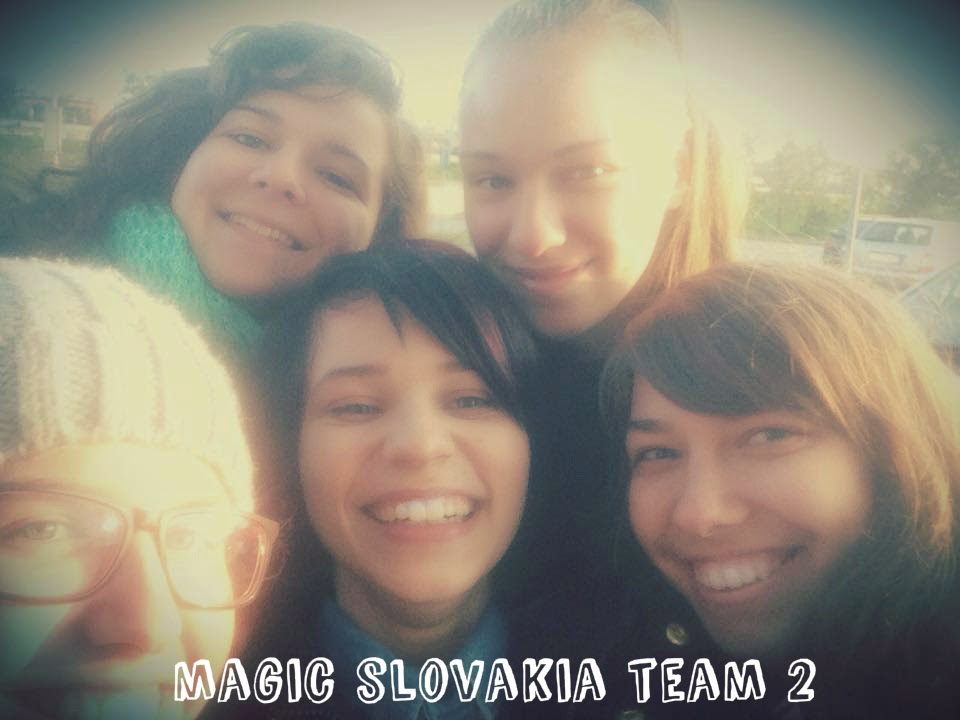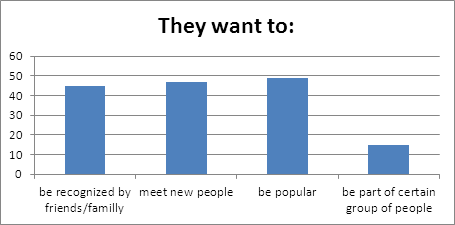Hello guys!
Our team was given a task to investigate the attitude to social networks amongst students from age 15 to 19. Here are the results of 100 questioned students from our school. 24 of them are 15 years old, 29 are 16, 23 are 17, 15 are 18 and 9 are 19 years old.
Let’s analyse each question at a time:
1. What social networks are used/popular in your country?
As seen in the chart, Facebook is the most known and used social network(100%). Next are Twitter, Google+ and Instagram. Pokec is a Slovak social network used for chating, meeting new people and date via anonymous accounts. The chart also shows that sites like Livejournal, Myspace and Flickr aren’t used so much. The sites above were given as options in our form of questionnaire. We also considered including other sites such as Youtube, but it wouldn’t be clear wheter the responders use the sites only as watchers or as uploaders, so we decided to leave out this option.
2. How much time do you/your friends spend on these networks?
3. What do you use these networks for?
The most common use of social networks is of course chatting, which was the answer of 96% of all responders. 49% answered sharing photos. Other answers include sharing and searching information about people, famous people or themselves. Some answered they play games there, ask classmates for homework or learn new information about people or events.4. Do you limit the access other people have to certain parts of your network?
The positive thing is that there is a small amount of students that share their information with everyone.
5. What sort of personal information do you/other people put on these sites?
Most of the students answered they share their age, gender, location, interests, school, familly and relationships. Less of them answered they share their religion, personal opinions, important events, nicknames on other sites. Two 15 year olds and one 17 year old answered they share their phone number, exact adress or bank account. This shouldn’t happen, given that this kind of information can be misused very easily.6. How much of that information do you think is "real"?
7. Have you ever said, posted or done anything on one of these sites that you regret?
Very few people actually answered this question. They either didn’t do anything they regret, didn’t want to answer, or didn’t remember anything they regret. Some answered they regret posting things from their childhood, inappropriate photos, comments or personal opinions. Few students answered they posted something that embarrased them and deleted it afterwards.8. Why do people share the information they put on these sites?
9. How many of your "friends" on these sites are your friends?
We can see that there are still students that have a lot of friends they don’t even know. But the positive thing is that the majority of responders actually knows their friends.10. Have you ever felt deceived by anything you have seen or read on these sites?
Again, the majority of asked students didn’t respond because of higher mentioned reasons. But some of them actually answered that they felt decieved by inappropriate posts(sexual content), stupidity, unrealness, untruth, rudeness of posts, acting of teenagers, gossiping about celebrities etc. Two of asked answered they felt decieved by finding about certain relationships in their neighbourhood.11. Have you ever had a bad experience because of something you, or someone else, posted on one of these sites?
From students that answered this question 15 years olds had written they had a bad experience because of the posted photos and videos, 16 and 17 years olds had a bad experience because of photos of themselves that they didn’t like or rude photos of young girls. 18 and 19 years old students had a bad experience because of gossiping „friends“ about their photos, the accounts being hacked/attacked, or photos that wasn’t allowed to be posted by people on them.12. What tips would you give to someone who is just starting to use these networks now?
There were some statements that repeated many times but they
are all true. Often mentioned tips were:
- Not to share private information (exact adress, phone number, bank account, password)
- Not to add strangers as friends
- To be careful what you share, post or add because you might regret it
- Not to spend too much time there, social networks shoulnd’t replace real life
- Not to act like somebody else or in other way than in reality
- To decide if you really want to start using these networks, learn from others’ mistakes
Some opinions were not to start at all, not to get addicted,
not to replace it with reality and communication face-to-face. We appriciate that
so many good tips were given and that our students know the dangerous aspects
of social networks.
At last but not least, we can summarize our research that students of our school are well informed about all kinds of social networks, they often use them not only for fun, but for school activities as well. Social networks can help organize students‘ lives, help them communicate with their friends and classmates and to meet new people. Social networks take a big part in our Comenius project, too, because that’s how we can know each other better. Chatting on Facebook or Google+, exchanging photos and information we want to share is the best way to accomplish it. It’s a positive thing that in this age of Internet communication it‘s a lot more easier way to meet more people from around the world.







No comments:
Post a Comment